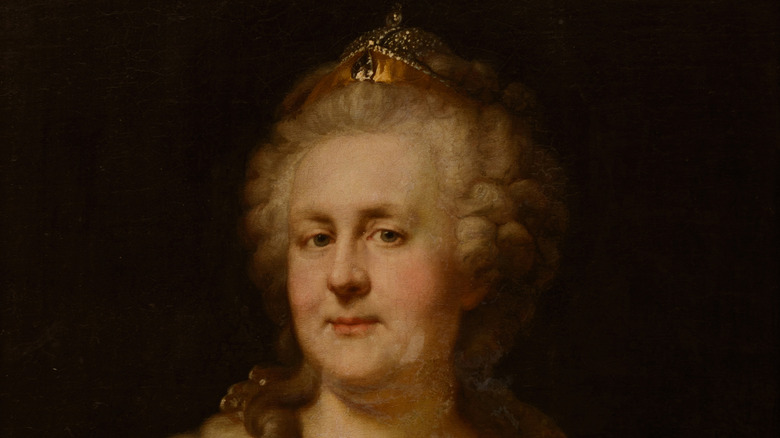What Elle Fanning Really Ate For Those Pregnancy Cravings On The Great
In the 2nd season of "The Great" — which premiered on Hulu on November 19, 2021 — Elle Fanning portrays a pregnant Catherine the Great, Empress of Russia. The season opens with Catherine already a good way through her pregnancy, so naturally, cravings crop up.
As the BBC reports, pregnancy cravings are neither a chemical compound in chocolate nor a hormonal mixture in humans. Rather, they are a psychological release from the strictures society normally places on women. For a comedy-drama series, this also means tapping into the eccentricities of an empress rumored to have enjoyed a sexual encounter with a horse (Bustle has pointed out that these rumors are false). So, as Catherine the Great, Elle Fanning can be seen sucking rusty nails, eating dirt, and munching on rose petals. But, this is television, right? Just as Kristen Stewart didn't actually chomp on a pearl necklace in "Spencer," some production trickery must have occurred.
Cravings are more psychological and cultural than biological
The show could not resist giving a visually striking interpretation of the common trope of cravings during pregnancy. But that question remains: How did they do it?
The topic arose in an interview with Entertainment Weekly, and it appears the film employed a good mixture of truth and trickery. According to Fanning, she insisted on introducing more realistic depictions than the production team initially tried. "At first," Elle Fanning recounted, "the rusty nail was chocolate — but it looked too much like chocolate, so I said, 'Just give me a real one.'" She had a similar issue with the rose petals. "And the rose petals were marzipan, but then I was like, 'That doesn't look real.' So I ate a real one." However, Fanning did not eat actual dirt — that was either brownies or crushed Oreos. Indeed, the difference between brownie crumbs and bits of crud probably didn't warrant a further attempt at realism.

